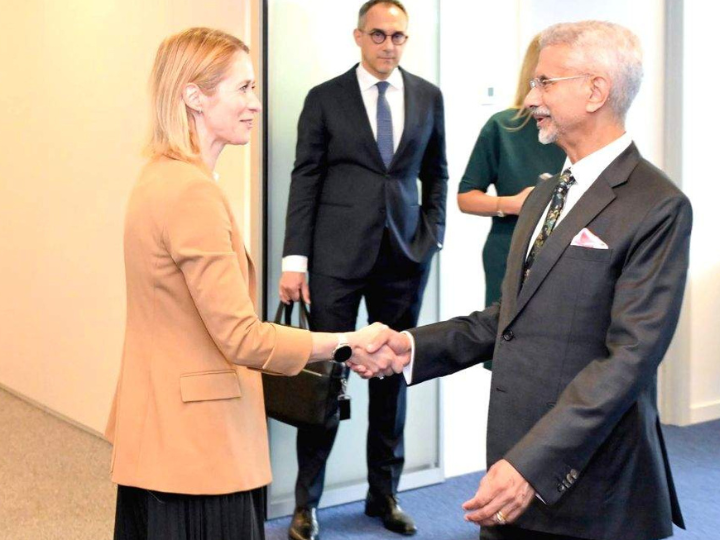by Rajnish Singh
The inaugural India-EU Strategic Dialogue, held in Brussels on 10 June 2025, marked a notable advance in the evolving partnership between the world’s largest democracy and its largest trading bloc. Co-chaired by EU foreign policy chief Kaja Kallas and Indian External Affairs Minister Subrahmanyam Jaishankar, the talks focused on defence, maritime security, counter-terrorism, cyber and AI cooperation, and space strategy.
“This is a big step forward for our partnership,” Kallas posted on X. Jaishankar echoed her optimism, calling the discussions “productive” and “focused on deepening our cooperation”.
The meeting builds on the 2020 EU-India Roadmap and follows a high-profile February visit to Delhi by Commission President Ursula von der Leyen and her College of Commissioners — a clear signal of Brussels’ commitment. Security cooperation took centre stage, from joint naval drills and cyber defences to counter-terrorism and space. The strategic goal is clear: to bolster resilience amid an increasingly fractured global order.
Technology and trade also took centre stage. Negotiations over the long-delayed Free Trade Agreement (FTA), stalled since 2007, have been reinvigorated, with leaders on both sides expressing hope for completion by year’s end. The EU-India Trade and Technology Council (TTC), launched in 2022, offers a structured mechanism for cooperation on artificial intelligence, semiconductors, and clean technologies. This alignment has a geopolitical subtext: reducing dependency on China while positioning both sides as innovation leaders.
The India-Middle East-Europe Economic Corridor (IMEC) and green tech investments also offer fertile ground for economic convergence. For EU firms, India represents not just a market of scale but also an increasingly vital partner in resilient supply chains and digital infrastructure.
Defence and security are also being prioritised. The EU aims to increase joint naval patrols and intelligence sharing, particularly in the Indo-Pacific region. India, wary of Chinese expansionism, is receptive — to a point. Strategic non-alignment, however, remains a cornerstone of New Delhi’s foreign policy.
Yet beneath the promising rhetoric, unresolved tensions risk stalling progress.
Top of the list is Russia. India’s refusal to condemn the invasion of Ukraine, along with its continued trade with Moscow, remains a point of friction in Brussels. India defends this position as “strategic autonomy”, a long-standing principle in its foreign policy. But to some in the EU, that amounts to little more than diplomatic fence-sitting. New Delhi, for its part, sees this criticism as hypocritical, pointing to the EU’s ongoing imports of Russian gas and fertilisers.
Another pressure point is Kashmir. The deadly terrorist attack in Pahalgam this April, which killed 26 civilians, reignited tensions between India and Pakistan. The aftermath saw diplomatic expulsions and limited military exchanges. In Brussels, Indian Foreign Minister S. Jaishankar was quick to clarify that the recent Operation Sindoor was aimed at terrorist infrastructure — not Pakistan itself. “Think of it less as a strike against Pakistan, and more against terrorism,” he told reporters.
While Brussels is sympathetic to India’s security concerns, unease lingers. There is growing apprehension that escalating regional tensions could divert political focus in New Delhi, potentially delaying progress on the FTA and other key initiatives just as talks begin to gather pace.
The EU has been unequivocal in condemning the Pahalgam attack, and officials from both sides are reportedly exploring deeper counter-terrorism cooperation. With terrorism a shared priority, this area could become a rare point of focused alignment between Brussels and New Delhi.
Yet the bloc’s influence in South Asia remains limited. EU calls for restraint carry far less weight than those from Washington DC or Beijing. Should India opt for a more forceful military response, it risks straining the trust the Strategic Dialogue is meant to foster. Such a scenario would also offer Pakistan’s military and intelligence services an opportunity to further stoke instability — potentially by enabling more cross-border terrorist attacks.
India and the EU stand to gain much from deeper cooperation, but patience, policy coherence, and geopolitical flexibility will be required. With a major EU-India Summit on the horizon, the path ahead will likely be defined not just by shared ambition, but by the ability to reconcile different worldviews in an increasingly volatile world.




 By: N. Peter Kramer
By: N. Peter Kramer
